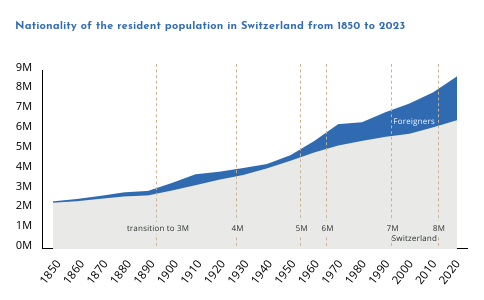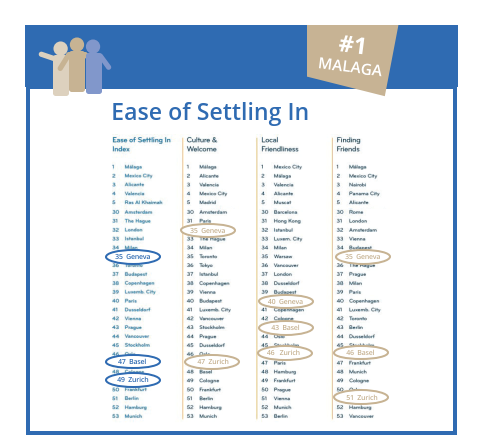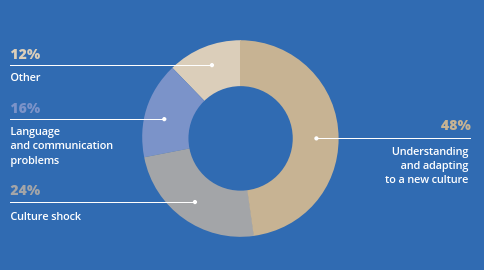
Newsletter
Publié le 05/05/2025
Expatriation to Switzerland: challenges and keys to successful integration
While Switzerland continues to attract new expatriates because of its exceptional quality of life, a recent study by the State Secretariat for Migration (1) reveals that in the space of 15 years, almost 44% of foreigners who arrived in 2009 will have left Switzerland by the end of 2023.
This phenomenon can be explained in part by the challenges associated with long-term integration into Swiss culture. The study also points out that the main reasons for moving to Switzerland are work, family reunification and education.
With employees and their families moving around the world in search of better job opportunities and new experiences, what are the best strategies for settling and integrating successfully in Switzerland?
THE APPEAL OF SWITZERLAND
AN ATTRACTIVE, COSMOPOLITAN COUNTRY

In its large-format report published in 2023, the newspaper Le Temps (2) highlights the development of the foreign population in Switzerland. In 2000, foreign residents accounted for 20.9% of the population, or around 1.53 million people. By 2023, this proportion had risen to 27%, equivalent to 2.41 million people, or a quarter of the total population. While these figures reflect the country’s cultural diversity, Swiss culture remains deeply rooted and predominant.
In Switzerland, almost 9 out of 10 people interact regularly with people of di?erent nationalities, origins or faiths. Most of these exchanges take place in the workplace (71%), where diversity is particularly prevalent (3). While these di?erences can represent challenges, they are also a source of enrichment, both professionally and personally.
WORLD RANKINGS: A COUNTRY WITH MANY ASSETS

According to HSBC’s Global Entrepreneurial Wealth Report 2024, Switzerland is one of the top destinations for entrepreneurs looking to move abroad, alongside Singapore, the United States and the United Kingdom.
Its leading position in renowned international rankings such as the Global Talent Competitiveness Index, the Global Innovation Index, the World Talent Ranking and the IMD World Competitiveness Ranking (4) illustrates its excellence in talent development, innovation and quality of life, underlining its status as an exceptional business hub.
Thanks to remarkable political and economic stability and an exceptional quality of life, Switzerland stands out as an environment of choice for companies and individuals seeking success in a competitive global market.
THE INTEGRATION OF EXPATRIATES IN SWITZERLAND

Home to many multinational companies, Switzerland is considered one of the best places in the world in which to live and work. While it ranks amongst the top 10 nations for job security and salary levels, it does not fare so well when it comes to the ease with which expatriates are able settle in. (5)
This difficulty in adapting can be explained by several factors (6), in part by the severe pressure on the property market, and amongst others the challenges associated with cultural integration. According to InterNations’ 2024 Ease of Settling In Index (7), Switzerland is among the lower rated countries in this ranking, with Zurich in 49th place, Basel in 47th and Geneva in 35th. In all three cities, a large proportion of expatriates report that their main friendships are with other expatriates (65% in Zurich and 58% in Basel, compared with 37% worldwide), reflecting the difficulty in forming ties with locals.
Back in 2021, the newspaper Le Temps highlighted the “lack of conviviality” in Switzerland and the difficulties expatriates have in feeling at home (8). The diversity of local languages is another obstacle to integration, reinforcing the feeling of being a foreigner, even after several years in the country. What’s more, the strong regional identities of the Swiss can be difficult to grasp for foreigners who have not been prepared for this diversity. (9)
Given this low ranking in terms of installation and integration, how can the situation be improved?
THE CHALLENGES OF LIVING IN A NEW CULTURE
 Living in a new environment brings with it a host of challenges, involving both work and family.
Living in a new environment brings with it a host of challenges, involving both work and family.
For the expatriate, this project raises several questions:
- What are the social rules in the new country?
- How can I develop a professional and personal network to help me feel included?
- What is the work-life balance like in the new country?
- Do I have to learn the country’s official language?
- Will my family and I be able to thrive in this new environment?
- Will my standard of living remain the same? What aspects are likely to change, improve or deteriorate?
- Are expectations in terms of work culture and communication clear and understandable?
Whether on a professional or personal level, expatriates must take the time to assess the gap between their own culture and social norms, and those of the host country.
Culture shock can lead to frustration and disengagement, especially if there is no support to help navigate these challenges.
Misinterpretations related to processes, and communication can lead to misunderstandings, and ultimately to complicating adaptation. Integrating into a new culture is a process of transformation which, although sometimes emotionally and logistically difficult, also offers a great opportunity for personal fulfilment, broadening of horizons and enriching discovery.
INTERCULTURAL AWARENESS TRAINING: THE BENEFITS TO COMPANIES
Investing in the international mobility of employees is costly for any company director, with a significant risk of losing qualified employees. In fact, up to 40% of assignments abroad are considered failures. (10)
A study on the challenges of global recruitment and managing an international workforce, carried out in 2016 by CEMS (a global network of academic institutions and companies) revealed that 46% of HR managers in large international companies (50% of which have more than 1,000 employees) have difficulty finding candidates with an international outlook.(11)
The main challenges faced by expatriates are:

Other problems raised include difficulties in finding a job when employees return (repatriation), high costs for the company and visa complications.
As Roland Siegers, Executive Director of CEMS, points out, companies need to invest in their employees to ensure that they have the skills to operate on a global scale, while also having the sensitivity to adapt to local circumstances. Offering intercultural awareness training has many advantages for companies:
- Strengthening its reputation as a global player
- Demonstrating its commitment to the local integration of its employees
Today, new talent attaches great importance to the well-being offered by their employer and expects to receive appropriate support for their integration. However, according to ERE Media (12), around 75% of companies do not offer adequate preparation or training before an international assignment.
For expatriates, taking part in training to raise awareness of the local culture increases the chances of successful integration, while promoting personal development and preparing them mentally for the big move!
For the company, this approach reduces the risk of failure on international assignments.
HOW LODGE RELOCATION FACILITATES A SUCCESSFUL MOBILITY EXPERIENCE
At Lodge Relocation, we put people at the heart of every relocation.
Our aim is to ensure that our customers are successful in every way, by making sure they are comfortable and integrated. With this in mind, we have developed our online intercultural awareness programme specifically focused on Swiss culture.
Even before their arrival in Switzerland, our intercultural awareness experts support expatriates and their families by:
- preparing them for the local culture
- developing their intercultural agility
- helping them to adopt more dynamic and situational approaches, free from value judgements
- answering all their questions, thereby reducing the stress associated with expatriation
This programme involves individual and personalised exchanges on subjects closely linked to culture and everyday life in Switzerland. A dynamic exchange that covers people, history, economics, politics, the workplace, traditions and house hunting, to name but a few. These exchanges encourage participants to explore new cultures and open the door to curiosity where barriers might otherwise exist.
Our customers’ feedback on the programme has shown us that those who follow it before arriving in Switzerland are better equipped to deal with the initial challenges of relocation and ultimately, their professional and personal integration.
Expatriation can be considered as a life changing event, a pivotal point in one’s career.
It requires proper preparation to reduce culture shock and to ensure that all concerned reap the benefits.
Sources
1. Statistique sur les étrangers / Secrétariat d’Etat aux Migrations
2. Population, immigration, ageing: discover Switzerland’s evolution in 15 graphs / Le Temps
3. Diversity and coexistence / Federal Statistical O?ce
4. Switzerland’s excellence in international rankings and World Competitiveness Ranking 2024 / GGBa
5. Expat Insider 2024: Want to Work Abroad? Discover the Best Cities for Your Career / InterNations
6. Why is the Swiss rental property market increasingly tight ? / Lodge location
7. Expat Insider 2024: Discover the Top Cities to Feel at Home Abroad in 2024 / InterNations
8. Expatriate in Switzerland, for better or for worse / Le Temps
9. Why do most expats leave Switzerland within 10 years? / Expat.com
10. New developments in executive relocation practices by Kristine Rushing, Brian H. Kleiner, 2003
11. Nearly half of HR managers struggle to recruit good global candidates, research ?nds / CEMS
12. How to Combat International Assignment Failure / ERE




